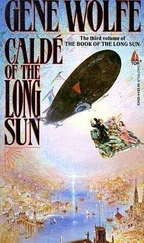Wolfe, Gene - The Best of Gene Wolfe
Здесь есть возможность читать онлайн «Wolfe, Gene - The Best of Gene Wolfe» весь текст электронной книги совершенно бесплатно (целиком полную версию без сокращений). В некоторых случаях можно слушать аудио, скачать через торрент в формате fb2 и присутствует краткое содержание. Жанр: Старинная литература, на английском языке. Описание произведения, (предисловие) а так же отзывы посетителей доступны на портале библиотеки ЛибКат.
- Название:The Best of Gene Wolfe
- Автор:
- Жанр:
- Год:неизвестен
- ISBN:нет данных
- Рейтинг книги:5 / 5. Голосов: 1
-
Избранное:Добавить в избранное
- Отзывы:
-
Ваша оценка:
- 100
- 1
- 2
- 3
- 4
- 5
The Best of Gene Wolfe: краткое содержание, описание и аннотация
Предлагаем к чтению аннотацию, описание, краткое содержание или предисловие (зависит от того, что написал сам автор книги «The Best of Gene Wolfe»). Если вы не нашли необходимую информацию о книге — напишите в комментариях, мы постараемся отыскать её.
The Best of Gene Wolfe — читать онлайн бесплатно полную книгу (весь текст) целиком
Ниже представлен текст книги, разбитый по страницам. Система сохранения места последней прочитанной страницы, позволяет с удобством читать онлайн бесплатно книгу «The Best of Gene Wolfe», без необходимости каждый раз заново искать на чём Вы остановились. Поставьте закладку, и сможете в любой момент перейти на страницу, на которой закончили чтение.
Интервал:
Закладка:
M
y father did not call a physician for David, but treated him himself; and if he was curious about the manner in which David had received his injury he did not show it. My own guess—for whatever it may be worth, this late—is that he believed I had stabbed David in some quarrel. I say this because my father seemed, after this, apprehensive whenever I was alone with him. He was not a fearful man, and he had been accustomed for years to deal occasionally with the worst sort of criminals, but he was no longer at ease with me—he guarded himself. It may have been, of course, merely the result of something I had said or done during the forgotten winter.
Both Marydol and Phaedria, as well as my aunt and Mr. Million, came frequently to visit David, so that his sickroom became a sort of meeting place for us all, only disturbed by my father’s occasional visits. Marydol was a slight, fair-haired, kindhearted girl, and I became very fond of her. Often when she was ready to go home I escorted her and on the way back stopped at the slave market, as Mr. Million and David and I had once done so often, to buy fried bread and the sweet black coffee and to watch the bidding. The faces of slaves are the dullest in the world, but I would find myself staring into them, and it was a long time, a month at least, before I understood—quite suddenly, when I found what I had been looking for—why I did. A young male, a sweeper, was brought to the block. His face as well as his back had been scarred by the whip, and his teeth were broken, but I recognized him: the scarred face was my own or my father’s. I spoke to him and would have bought and freed him, but he answered me in the servile way of slaves and I turned away in disgust and went home.
That night when my father had me brought to the library—as he had not for several nights—I watched our reflections in the mirror that concealed the entrance to his laboratories. He looked younger than he was; I, older. We might almost have been the same man, and when he faced me and I, staring over his shoulder, saw no image of my own body, but only his arms and mine, we might have been the fighting slave.
I cannot say who first suggested we kill him. I only remember that one evening, as I prepared for bed after taking Marydol and Phaedria to their homes, I realized that earlier when the three of us, with Mr. Million and my aunt, had sat around David’s bed, we had been talking of that.
Not openly, of course. Perhaps we had not admitted even to ourselves what it was we were thinking. My aunt had mentioned the money he was supposed to have hidden; and Phaedria, then, a yacht luxurious as a palace; David talked about hunting in the grand style, and the political power money could buy.
And I, saying nothing, had thought of the hours and weeks and the months he had taken from me; of the destruction of my self , which he had gnawed at night after night. I thought of how I might enter the library that night and find myself when next I woke an old man and perhaps a beggar.
Then I knew that I must kill him, since if I told him those thoughts while I lay drugged on the peeling leather of the old table he would kill me without a qualm.
While I waited for his valet to come I made my plan. There would be no investigation, no death certificate for my father. I would replace him. To our patrons it would appear that nothing had changed. Phaedria’s friends would be told that I had quarreled with him and left home. I would allow no one to see me for a time, and then, in makeup, in a dim room, speak occasionally to some favored caller. It was an impossible plan, but at the time I believed it possible and even easy. My scalpel was in my pocket and ready. The body could be destroyed in his own laboratory.
He read it in my face. He spoke to me as he always had, but I think he knew. There were flowers in the room, something that had never been before, and I wondered if he had not known even earlier and had them brought in, as for a special event. Instead of telling me to lie on the leather-covered table, he gestured toward a chair and seated himself at his writing desk. “We will have company today,” he said.
I looked at him.
“You’re angry with me. I’ve seen it growing in you. Don’t you know who—”
He was about to say something further when there was a tap at the door, and when he called, “Come in!” it was opened by Nerissa, who ushered in a demimondaine and Dr. Marsch. I was surprised to see him, and still more surprised to see one of the girls in my father’s library. She seated herself beside Marsch in a way that showed he was her benefactor for the night.
“Good evening, Doctor,” my father said. “Have you been enjoying yourself?”
Marsch smiled, showing large, square teeth. He wore clothing of the most fashionable cut now, but the contrast between his beard and the colorless skin of his cheeks was as remarkable as ever. “Both sensually and intellectually,” he said. “I’ve seen a naked girl, a giantess twice the height of a man, walk through a wall.”
I said, “That’s done with holographs.”
He smiled again. “I know. And I have seen a great many other things as well. I was going to recite them all, but perhaps I would only bore my audience; I will content myself with saying that you have a remarkable establishment—but you know that.”
My father said, “It is always flattering to hear it again.”
“And now are we going to have the discussion we spoke of earlier?”
My father looked at the demimondaine; she rose, kissed Dr. Marsch, and left the room. The heavy library door swung shut behind her with a soft click.
L
ike the sound of a switch, or old glass breaking.
I
have thought since, many times, of that girl as I saw her leaving: the high-heeled platform shoes and grotesquely long legs, the backless dress dipping an inch below the coccyx. The bare nape of her neck, her hair piled and teased and threaded with ribbons and tiny lights. As she closed the door she was ending, though she could not have known it, the world she and I had known.
“She’ll be waiting when you come out,” my father said to Marsch.
“And if she’s not, I’m sure you can supply others.” The anthropologist’s green eyes seemed to glow in the lamplight. “But now, how can I help you?”
“You study race. Could you call a group of similar men thinking similar thoughts a race?”
“And women,” Marsch said, smiling.
“And here,” my father continued, “here on Sainte Croix, you are gathering material to take back with you to Earth?”
“I am gathering material, certainly. Whether or not I shall return to the mother planet is problematical.”
I must have looked at him sharply; he turned his smile toward me, and it became, if possible, even more patronizing than before. “You’re surprised?”
“I’ve always considered Earth the center of scientific thought,” I said. “I can easily imagine a scientist leaving it to do fieldwork, but—”
“But it is inconceivable that one might want to stay in the field?
“Consider my position. You are not alone—happily for me—in respecting the mother world’s gray hairs and wisdom. As an Earth-trained man I’ve been offered a department in your university at almost any salary I care to name, with a sabbatical every second year. And the trip from here to Earth requires twenty years of Newtonian time, only six months subjectively for me, of course, but when I return, if I do, my education will be forty years out of date. No, I’m afraid your planet may have acquired an intellectual luminary.”
My father said, “We’re straying from the subject, I think.”
Marsch nodded, then added, “But I was about to say that an anthropologist is peculiarly equipped to make himself at home in any culture—even in so strange a one as this family has constructed about itself. I think I may call it a family, since there are two members resident besides yourself. You don’t object to my addressing the pair of you in the singular?”
Читать дальшеИнтервал:
Закладка:
Похожие книги на «The Best of Gene Wolfe»
Представляем Вашему вниманию похожие книги на «The Best of Gene Wolfe» списком для выбора. Мы отобрали схожую по названию и смыслу литературу в надежде предоставить читателям больше вариантов отыскать новые, интересные, ещё непрочитанные произведения.
Обсуждение, отзывы о книге «The Best of Gene Wolfe» и просто собственные мнения читателей. Оставьте ваши комментарии, напишите, что Вы думаете о произведении, его смысле или главных героях. Укажите что конкретно понравилось, а что нет, и почему Вы так считаете.









